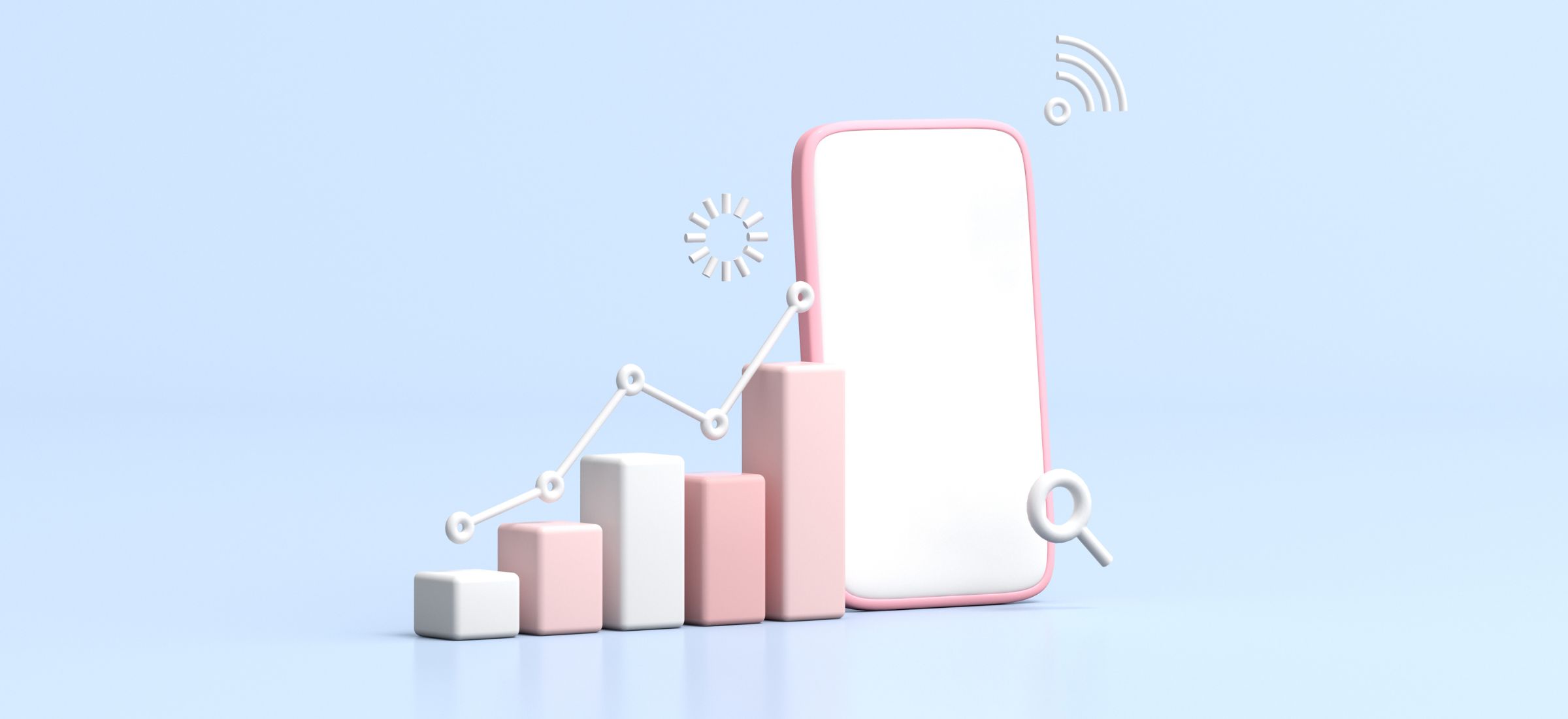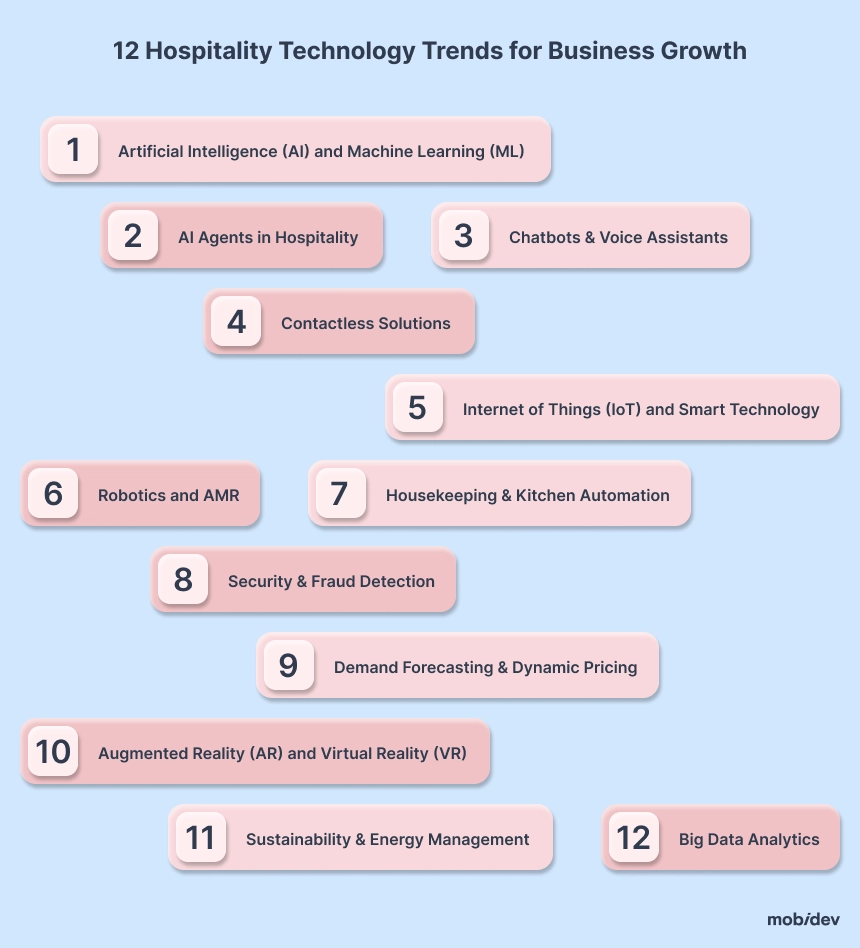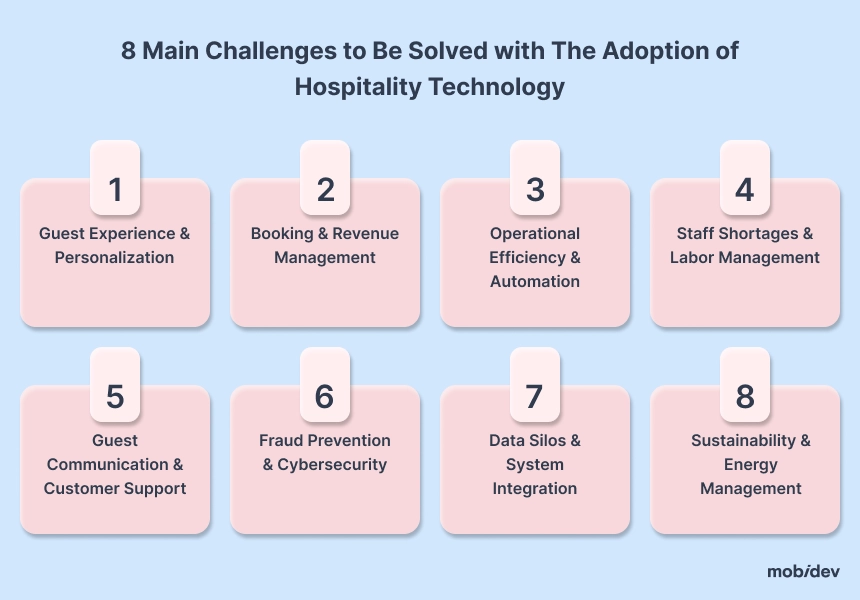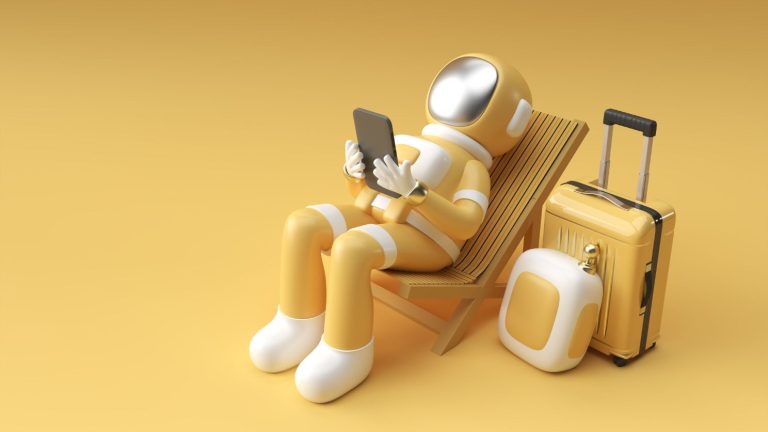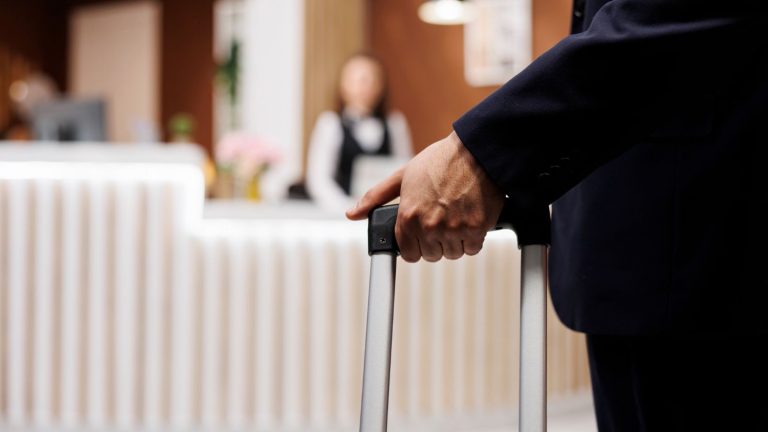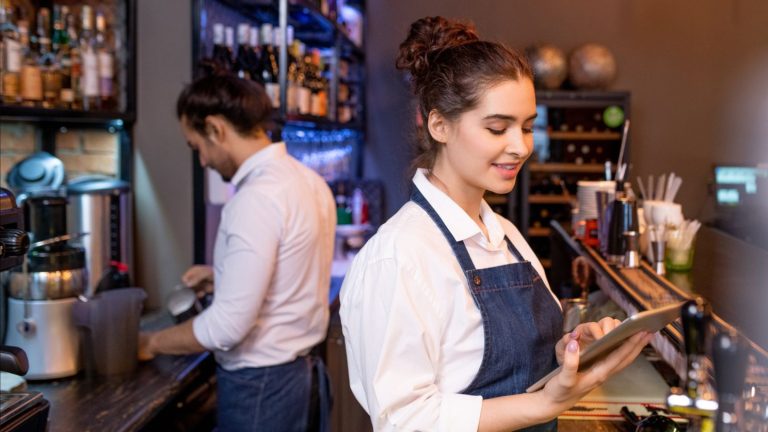Contents:
Hospitality industry leaders are rapidly embracing new technology that will enable them to achieve a competitive advantage in the future. At the same time, SaaS providers are seeking new ways to enhance the functionality of their products using the latest possibilities in artificial intelligence, big data, and machine learning. Their innovations are shaping the modern hospitality technology trends.
To create this guide, two MobiDev Solutions Architects, Andrew Makarov and Serhii Koba, were involved. Andrew specializes in iOS/Android and AR development as well as the integration of cutting-edge technologies in hospitality solutions. Serhii works on implementing complex ERP and POS systems and other solutions for hospitality and retail.
In this article, you will learn about 12 of the latest technology trends in the hospitality industry and get some practical insights on implementing them.
Hospitality Technology Trends: Overview
As the hospitality industry strives for improved guest experiences, guests expect enhanced experiences while visiting hotels or restaurants. At the same time, economic turbulence, like rising prices, influences your back-of-house, pressing businesses to come up with cost-saving and operational efficiency measures.
On top of that, industry leaders like Marriott Hotels or the Hilton Group have already implemented some of the cutting-edge technologies, setting new industry standards.
Additionally, tech start-ups, like the Japanese Henn-na Hotel, which has quickly become world-popular as the first completely robot-staffed hotel, heighten the competition.
Therefore, for hoteliers and restaurateurs, being literate in modern technology is no longer a matter of choice. For SaaS companies, it is a golden hour to grow their client base by introducing new features that help hospitality businesses optimize their operations, improve guest experience, and cut costs with automation capabilities.
Hospitality Industry Technology Trends 2026: Market Data
The latest technology trends in the tourism and hospitality industry show a growing interest in artificial intelligence. According to Statista, as of last year, most tech investments in the global travel sector were in AI and ML, which took 65% of all investments. According to McKinsey, despite the overall interest, only 1% of businesses believe they have achieved maturity in their AI/ML journey. This creates space for SaaS software, making implementing AI and ML into hospitality technology simpler and faster.
Tourism growth and increased investment fuel the adoption of IoT. According to the Smart Hospitality Global Market Report 2025, the hospitality tech market is projected to reach $29.65B in 2025, growing at a CAGR of 27.8%.
The same applies to robotics. According to Hospitality Robot Market Report, the hospitality robot market is projected to grow at a CAGR of 25% from 2024 to 2033 and reach $3,26B by 2033.
This rapid growth proves that hospitality technology can solve multiple challenges the hospitality businesses face.
8 Main Challenges to Be Solved with The Adoption of Hospitality Technology
Among the primary challenges to be solved with the implementation of hospitality technology are the following:
1. Guest Experience & Personalization
Guests are ready to spend money on personalized experiences. Yet, legacy systems and outdated tech make this impossible. Modernize legacy systems and develop hospitality software to personalize offerings and increase client engagement.
2. Booking & Revenue Management
In hospitality, customer flow is often affected by hidden trends that are not visible in manual demand forecasting. Custom AI solutions will help you uncover hidden trends and analyze the competitive market to make effective AI demand forecasting.
3. Operational Efficiency & Automation
In hospitality, many operations are running in full force simultaneously. This leads to order mistakes and service delivery delays. Build custom Property Management Systems or Inventory Management Systems as a solution to this challenge. These systems help perform tasks faster, reduce errors, and increase efficiency.
4. Staff Shortages & Labor Management
Employee turnover and understaffing can put your business at risk of losing clients and receiving poor reviews. AI agents, robotic concierges, contactless check-ins, and chatbots will streamline your core processes and increase customer satisfaction.
5. Guest Communication & Customer Support
Slow response times damage a business’s reputation. Inconsistent services due to task overload create operational challenges, like orders not being fulfilled. To avoid these situations, we recommend software for customer communication, such as virtual assistance, automated maintenance requests, and self-service kiosks.
6. Fraud Prevention & Cybersecurity
Businesses incur costs due to fraud from both guests and workers. Also, on average, 31% of hospitality companies experience a data breach. AI-enhanced security systems solve this issue. A fraud detection system can be integrated into your software. At MobiDev, we recommend ensuring your IT architecture is ready for cyberattacks. You must build your solutions following security and data privacy benchmarks to do this.
7. Data Silos & System Integration
Modern hospitality businesses heavily rely on using multiple IT tools like POS, ERP, CRM, etc. Each of these tools handles some part of the workflows and stores data. Besides some level of effectiveness, they also bring about data silos, operational disruptions, and a lack of visibility. With MobiDev, you can consolidate data in one place and integrate the tools your business uses into one system. This way, you’ll tackle data silos, get complete visibility into your processes, and the seamless flow of your business operations.
8. Sustainability & Energy Management
The hospitality industry often has an adverse impact on the local environment. As more people and businesses embrace an environmentally friendly mindset, they consider eco-friendly initiatives when choosing service providers and partners.
To ensure your business follows the best sustainability practices, we suggest building systems that reduce waste and energy use. They may include HVAC and lighting systems, laundry optimization, and sustainable sourcing.
As businesses approach these challenges industry-wide, they shape hospitality technology trends. You may read about the most common ones below.
Summary Table: 12 Hospitality Technology Trends
| # | Trend | Trend overview | Hospitality challenges trend addresses | How to implement the trend |
|---|---|---|---|---|
| 1 | Artificial Intelligence (AI) & Machine Learning (ML) | Using AI/ML for automation and predictive analytics — e.g. forecasting demand, optimizing resources, personalizing guest experience. | Helps with labor & resource planning, cost control (waste reduction), and personalization of services. | Prepare clean structured data; integrate ML models into property-management or CRM systems for analysis and actionable insights. |
| 2 | AI Agents in Hospitality | Intelligent agents that can have reasoning/decision-making capabilities to automate guest communication, back-office tasks, orders, staff scheduling, etc. | Reduces staff workload, helps with staff shortages, automates routine tasks like bookings, orders, scheduling. | Collect and manage data (bookings, occupancy, loyalty, etc.); integrate the agent with existing PMS/CRM/POS systems; modernize legacy systems if needed. |
| 3 | Chatbots & Voice Assistants | Conversational interfaces (chatbots, voice assistants) for guest support — answering FAQs, taking orders, guiding guests, making recommendations. | Improves guest communication and support; reduces staff burden; speeds up service delivery and response times. | Develop a chatbot (e.g. using foundation models + RAG) tied to your data (rooms, menus, services); integrate it into website/app; optionally add smart-speakers in-room. |
| 4 | Contactless Solutions | Mobile check-in/out, digital room keys, contactless payments and ordering — minimizing physical interaction and manual processes. | Speeds up check-in/out, reduces friction and waiting times, eases staff workload, improves guest convenience. | Build or adopt mobile app or web portal integrated with property management; add payment gateways; for restaurants: digital menus, self-ordering kiosks or tablets. |
| 5 | Internet of Things (IoT) & Smart Technology | Network of connected devices (thermostats, lighting, sensors, smart locks, kitchen/beverage sensors) to automate and optimize operations and guest environment. | Improves operational efficiency, energy savings, automation of repetitive tasks, reduces dependence on workforce. | Install IoT devices (sensors, smart locks, thermostats etc.), choose connectivity (Wi-Fi, BLE, Zigbee, etc.), and build or integrate a platform that manages these devices and generates alerts/data. |
| 6 | Robotics | Use of robots for tasks like delivery (room service, food), reception/autonomous concierge, luggage handling, cleaning, or table/wait-service in restaurants. | Addresses staff shortages, reduces human-contact needs, increases consistency and speed of service, improves efficiency. | Integrate robots with existing service request or IoT systems; ensure proper infrastructure and data pipelines for navigation, scheduling, and coordination. |
| 7 | Housekeeping & Kitchen Automation | Use of mobile apps for staff coordination, robotics for cleaning, RFID tracking for linen/inventory; also kitchen automation (prep-stations, IoT ovens, automated POS/inventory) for restaurants/hotels. | Helps manage large number of rooms or kitchen orders, reduces mistakes and delays, improves coordination and speed of service. | Deploy IoT (sensors, RFID), automation hardware (robotic cleaners, smart kitchen equipment), and integrate them into a centralized management system. |
| 8 | Security & Fraud | Detection Use of AI (web behavior analysis, biometric authentication, AI-driven CCTV) to detect fraudulent bookings, identity theft, suspicious payments, etc. | Protects against fraud, chargebacks, identity theft, and reduces financial risks — a big problem for hospitality businesses. | Integrate AI-based fraud detection tools with POS, ERP, CRM systems; optionally add biometric and CCTV-based identity verification to bookings/transactions. |
| 9 | Demand Forecasting & Dynamic Pricing | Systems that forecast demand (occupancy, bookings) using data like historical occupancy, events, competitor pricing, enabling dynamic pricing strategies. | Helps optimize occupancy rates and revenue — avoiding empty rooms or overbooking, adjusting prices timely for demand fluctuations. | Build a revenue management system (RMS) integrating historical data, event calendars, competitor pricing; integrate with hotel ERP and CRM to apply dynamic pricing. |
| 10 | Augmented Reality (AR) & Virtual Reality (VR) | Use of AR/VR to create virtual tours, interactive hotel maps, in-room guides, digital menus, immersive guest experiences, and more engaging stays. | Helps with guest engagement, marketing (showcasing rooms/properties), and improving guest experience — differentiating from competitors. | Develop VR walkthroughs for booking websites; build AR/VR features in hotel apps using AR-frameworks or platforms to create interactive property maps or digital twins. |
| 11 | Sustainability & Energy Management | Adoption of energy-efficient lighting, smart HVAC, sensors, water-saving fixtures and other eco-friendly tech to reduce environmental impact and costs. | Addresses rising energy costs, environmental impact, regulatory/societal pressure for sustainability, and operational cost reduction. | Install LED lighting, smart sensors/dimmers, smart HVAC/AC controls, water-saving fixtures; integrate all monitoring into dashboards via a management system to track usage and optimize consumption. |
| 12 | Big Data Analytics | Consolidating data from bookings, occupancy, operations, guest feedback, financials etc., to derive insights for personalization, forecasting, resource planning. | Converts dispersed data into actionable insights — helping with demand forecasting, personalization, operations optimization, resource allocation. | Build data pipelines (ETL), data lakes or BI platforms, integrate data from PMS, POS, CRM, guest reviews etc.; use analytics tools (e.g., dashboards, BI tools) to visualize and act on insights. |
Trend #1. Artificial Intelligence (AI) and Machine Learning (ML)
Artificial intelligence and machine learning are two of the most talked-about technological trends in the tourism and hospitality industry. The primary use cases are automation and building predictive mechanisms. Let’s review them closely.
Predictive analytics is about having systems in place to face challenges in time. In the hospitality sector, predictive analytics is used across labor, prices, materials, supply chains, and customer flow use cases. When combined and processed in time, these data allow businesses to build muscles to be prepared for various situations.
Another realm where AI and ML impact personalization is the hospitality sector. The sector is overloaded with customer data, such as booking and payment, social media reviews, and order histories, yet lacks instruments to drive insights. AI helps hospitality sort out signals from noise and get a better view of every customer’s tastes and needs.
AI enhances operational efficiency, which helps avoid passing costs onto customers as food and energy prices climb. Using an AI tool for ingredient tracking that adjusts preps according to demand, a business may cut food waste.
For SaaS producers, implementing the features described here will be a solid competitive boost, for interest in AI technology is growing. As the primary hospitality SaaS adopters become more AI-aware and ready, the producers have nothing left but to follow this trend.
3 Steps to Implement AI/ML Trend in Hospitality
- Preparing the data is essential before using AI or ML for predictive analytics or enhancing operational efficiency.
- You need clean, structured data to train statistical algorithms to meet the custom demands of your business.
- Next, you will integrate ML models into property management software and CRM systems to analyze data and present results in a user-friendly interface.
Trend #2. AI Agents in Hospitality
AI Agents are a relatively new AI technology capable of reasoning, making decisions, and acting accordingly. They can offer a wide range of automation capabilities for hospitality businesses, streamlining both client-facing and back-office operations. Let’s briefly overview the most popular use cases, and for more detailed information, read our AI Agents in Hospitality: Use Cases for Hotels, Restaurants, and Bars guide.
3 Capabilities of AI Agents in Hospitality
1. Guest Communication Capabilities
For example, an AI agent communicates with a customer during a website inquiry, like a bot, but it also follows up with the same customer on the in-house tablet and sends them post-stay emails. At the same time, all the history of interactions is stored in one place, which relieves the staff from hunting down separate logs.
Thanks to this feature, AI agents can automate guest interactions, provide personalized recommendations, or assist personnel behind the scenes.
2. Back-Office Capabilities of AI Agents
An AI agentic scheduler uses the AI prediction mechanisms to establish demand levels and staff availability and drafts shifts in accordance with labor laws. The hotel manager can edit them later if changes are needed and use this material for staffing.
Similarly, a back-office agent can compare historical consumption levels, upcoming bookings, and supplier lead times and trigger purchase orders at the ideal moment.
The applications of AI agents also extend to housekeeping automation, energy saving mechanisms, online booking engines and more.
3. AI Ordering Agents
AI ordering agents are systems powered by LLMs that can engage in conversations with customers and take their orders or help them with bookings. There are several types of these agents:
- AI phone ordering systems
- Chatbots
- Touch interfaces
The key benefits of these systems include:
- 24/7 operations
- Personalized recommendations
- Multilanguage support
- Low employee engagement.
AI Agents in SaaS
For SaaS owners, it is essential to mention that agentic AI is on the rise and may soon be a sought-after feature in the hospitality SaaS offering. Therefore, adding AI agents to your SaaS offering will provide a competitive edge and make your solution future-ready.
Based on natural language processing technology and decision-making algorithms, AI agents streamline user experience by offering 24/7 support. Yet, the technology is complex, and implementing it requires preparation.
How to Implement This Trend
While developing AI agents for hospitality, users must consider infrastructure, data, and compliance. Data is the backbone of AI agents in hospitality. You must collect and manage information about booking details, loyalty programs, or room occupancy statuses.
The ready solution must be integrated with existing systems, such as PMS (Property Management System), POS, reservation channels, and CRM software. If the systems mentioned are outdated and not capable of handling AI plug-ins, your business may require legacy system modernization.
Trend #3. Chatbots & Voice Assistants
Modern conversational interfaces can relieve hospitality personnel of a lot of the burden of daily tasks. For example, service bots answer FAQs, accept orders, navigate guests through their stay, and provide recommendations.
Hotels and restaurants are also using chatbots for promotional purposes. For example, a chatbot can promote additional hotel services like spas during a guest’s stay or offer room recommendations or discounts during guest inquiries.
When implemented into hotel apps and rooms, such intelligent assistants will reduce guests’ friction while ordering services, cut waiting times, and automate many routines, letting the personnel focus on customer care.
How to Implement This Trend
You can develop a chatbot as a separate product based on one of the foundation models and retrieval augmented generation (RAG) or the technology that bridges the chatbot with your business data (information on rooms, restaurant menus, interesting places to visit nearby, etc.).
This AI assistant can be integrated into your business website and app. If you implement Alexa-type in-room smart speakers, you can provide innovative assistant services directly in hotel rooms.
Trend #4. Contactless Solutions
Contactless technology minimizes direct interaction with staff and simplifies hotel arrival experiences. Properties with these solutions implemented achieve operational improvements. For example, integration of a PMS and offering guests a way to manage their stay with a mobile app can reduce check-in and check-out time as well and increase customer satisfaction.
The impact of mobile check-ins extends beyond mere convenience for visitors and hotel staff. Wyndham Hotels & Resorts’ experience proves that this technology effectively protects hotels from chargebacks thanks to this system of guest verification.
Contactless check-ins can be adopted through mobile apps or robotic concierge systems. Such a system proved quite effective in the Hilton hotel chain, which uses a custom mobile app for contactless check-ins and check-outs.
The Jumeirah Hotel Group uses facial IDs for the same purpose. Guests can book rooms, open their doors, and check out using only facial biometrics.
Restaurant technology trends also include contactless point-of-sale solutions, which allow customers to order food, learn about dish ingredients, and make payments using apps, POS terminals, or restaurant tablets.
How to Implement This Trend
To provide contactless services, businesses have to adopt mobile apps or web portals with the corresponding software. With the help of a development team, you can integrate this solution into the existing property management system.
When implemented, every customer with a smartphone can use the mobile room key, generated in-app.
The implementation will also require payment gateways like Stripe or Braintree.
To enable contactless solutions in a restaurant, you can develop 4 layers:
- a digital menu with complete information about food ingredients, including allergy alerts
- a restaurant app
- self-ordering kiosks
- at-the-table ordering systems like tablets, or even robots.
Trend #5. Internet of Things (IoT) and Smart Technology
In practice, IoT in hospitality creates a network of connected devices that enable hotels and restaurants to automate services, personalize guest experiences, and optimize operational efficiency.
These systems allow for remote monitoring and controlling of lighting, heating, air conditioning systems, cooling systems for beverages and food, and other equipment in the hotel area or the restaurant kitchen. IoT devices implemented in rooms allow hotels to preserve energy when a guest leaves the hotel and keeps the light on, as well as understand if the premises require cleaning.
Integration with AI enables hospitality businesses to automate control over these systems. It further reduces the number of errors and makes your business less dependent on your workforce.
Our team developed a solution called BarTrack, which helps sustain the optimal temperature for beverages like beer. BarTrack can also track pressure and keg levels. The information about these things is available on desktops, laptops, or smartphones, allowing for better visibility of supplies, providing data for demand forecasting, and alerting when the beverage storage system has flaws.

Learn Deeper:
Draft Beverage Management Platform with IoTHow to Implement This Trend
To implement this trend, it is recommended that smart thermostats, occupancy sensors, motion detectors activating lighting, smart locks, etc are used.
Choosing the right connectivity technologies is very important for gluing together the devices described. Wi-Fi and Ethernet remain the top choices for high-bandwidth data transfer. Technologies like Bluetooth Low Energy (BLE), Zigbee, and LoRaWAN extend connectivity to a wider range of low-power devices. They are particularly needed for devices scattered across larger properties or in remote locations.
To help these connected devices do the real magic, platforms connecting them are needed.
For this, MobiDev can develop a software solution for tracking IoT performance, generating alerts, and making recommendations. We can also provide businesses and SaaS providers with IoT consulting on setting up these devices and maintaining them.
Additionally, edge computing is increasingly employed. In essence, it is the technology of smart devices that can do some computing by themselves. For example, smart cameras process information on the spot and only send videos to the data centers when something extraordinary happens. Since edge computing pushes some decision-making closer to the devices themselves, it allows for faster responses and reduced latency.
The smooth communication between the devices is ensured by the standardized protocols. MQTT (Message Queuing Telemetry Transport) and CoAP (Constrained Application Protocol) are optimized for small-packet, low-power communication, making them ideal for battery-operated sensors. Meanwhile, RESTful HTTP handles bulk data transfers, ensuring larger files and requests are processed efficiently.
If you are a SaaS provider, there is a chance for you to market your hospitality product as IoT-ready, by providing a flexible architecture that ensures simple integration with the third-party agents.
Trend #6. Robotics
Robots are used in various ways in the hospitality industry, from room service delivery and cleaning to automated concierge kiosks. Below are several examples of how hotels and restaurants leverage robotics.
Robotics streamlines interaction with guests. When human workers are busy, concierge robots powered by AI and voice recognition can help guests with various queries. Meanwhile, reception robots can handle front desk tasks, like checking guests in, answering questions, authenticating IDs, accepting payments, and giving room keys. Robots at the Japanese Henn-na Hotel are a great example of this technology.
Some of the most useful robots in the hospitality industry are delivery robots. These robots can navigate hotels and bring food, drinks, and other items. They use navigation technology and visual recognition to avoid collisions, use elevators, and find the right doors.
Many hotels use luggage handling robots that automatically carry multiple bags simultaneously and complete multiple journeys sequentially.
Restaurant waiting robots can take orders like self-service kiosks or do tasks like bringing plates to the table and accepting payments.
Altogether, these use cases prove that robotics in the hospitality sphere increases efficiency and reduces human contact.

Learn Deeper:
Client Success Story: Building Delivery AMRHow to Implement This Trend
To effectively implement this trend in your hospitality business, you must integrate autonomous robots within your existing systems, like service request systems. They can also be connected to the existing IoT system.
For this you have to provide the secure and flexible infrastructure and create clear data pipelines to train robotic assistants in your property.
Trend #7. Housekeeping & Kitchen Automation
In the hospitality business, the ability to deliver services quickly impacts revenues directly.
This advantage today is achieved through hardware and software enhancements and their implementation in housekeeping.
In a restaurant kitchen, faster service and other perks are achieved with kitchen automation and other restaurant technologies.
The primary challenge for hotel housekeeping has always been organization. Hotel staff don’t just have to take care of hundreds of rooms, but also communicate their status and take on new tasks quickly. This issue can be solved with housekeeping mobile apps. They allow managers to quickly assign tasks, track their performance, and enhance real-time collaboration and staff communication. They also allow guests to request housekeeping from an app, which further streamlines the speed of service.
Hardware, like remotely controlled vacuum cleaners, enhances the speed of cleaning rooms, while linen tracking RFID technology allows hotel inventory to be tracked without manual counting.
Kitchen automation technology also combines robotics and software automation. Automated prep stations help with ingredient preparation. IoT-automated ovens can be voice-activated and programmed for specific cooking regimes, eliminating food waste. Automated POS systems allow inventory tracking, providing the basis for demand-tracking software.
How to Implement This Trend
Implementing this trend requires IoT, for example, RFID chips for linen tracking, automation hardware, such as robotic cleaners, or remote air conditioning, and software to integrate automation into existing systems.
For example, a business can implement robotic appliances and IoT and develop a centralized system for their management.
Trend #8. Security & Fraud Detection
The hospitality sector is an easy target for fraud because low-value transactions often go unnoticed. According to the Association of Certified Fraud Examiners Report, the median financial loss due to occupational fraud is $100,000.
Fraudsters use real and fake information to purchase, book accommodations, and pay restaurant bills. When discovered later, these cases lead to chargebacks and financial losses for hotels, restaurants, and online travel agencies.
Traditional security systems often cannot identify fraud rings hidden among reports and other data. Yet, AI technology makes things different, helping business owners detect fraud early and save expenses.
AI tools provide web behavior analysis, helping detect potential fraud and mitigating online account takeover risk. This is done by checking the user’s browsing history on the site, booking, and payment preferences. This method usually lets you spot identity theft and detect fraudulent activity quickly.
Ready to hear a story about a $7,000 “tip” flagged by the AI we made for a POS?

Check out:
Webinar on AI Applications in POSImage recognition can also help verify government-issued IDs to verify identity and prohibit credit card theft.
Biometric authentication provides another layer of security. Hotels may use AI-driven CCTV to establish their visitors’ real identities and exclude the possibility of identity theft.
How to Implement This Trend
Hospitality businesses and Hospitality SaaS platforms can integrate AI and ML tools with their POS, ERPs and CRMs to generate alerts about fraudulent bookings and credit card transactions. AI-driven CCTV and biometric identification integrated into hotel systems allow you to detect identity theft.
Success Story: Developing an Enterprise Verification-as-a-Service Solution
MobiDev was tasked with developing a single sign-on identity verification system that combined face and voice recognition.
While maintaining the stringent standards for sensitive biometric data, our product also achieved high facial and voice recognition accuracy. Today it can perform flawlessly regardless of lighting conditions, face angles, or background noise.
Since it is a web-based application, it can work on mobile phones or any computer equipped with a microphone and a camera.
Tend #9. Demand Forecasting & Dynamic Pricing
Demand forecasting allows businesses to predict demand fluctuations and adjust prices to sustain high occupancy rates. Yet, traditional forecasting methods often skip signals of upcoming change.
AI-based prediction algorithms process a wider range of data, including historical data, event calendars, and competitor pricing. Moreover, they can collect and process data in real time and notify users when a change in the current strategy may be favorable.

Learn Deeper:
Demand Forecasting for Growth: Use CaseHow to Implement This Trend
Businesses build revenue management systems (RMS) with historical data, event calendars, and competitor pricing to benefit from data forecasting and dynamic pricing. These systems can be integrated with the hotel ERP and CRM.
Trend #10. Augmented Reality (AR) and Virtual Reality (VR)
AR and VR technologies allow for a more engaging and personalized stay for guests. They offer virtual tours, guide customers through hotels, and enhance in-stay experiences. For example, AR apps overlay digital information over the physical environment. Guests easily access information about the hotel by using them in a hotel room or on the property.
In other use cases, hotels and restaurants use VR and AR technologies to present customers with digital menus or entertainment. For example, the Le Petit Chef restaurant uses a 3D projection that displays a miniature chef who “prepares” in front of guests while they wait for actual meals.
For hotels, VR technology enables virtual tours of the rooms and territories to boost guest conversions.
How to Implement This Trend
To implement this trend, businesses may consider creating VR walkthroughs for booking websites or adding VR/AR features to hotel apps.
Such apps can also be AR in-room guides or interactive property maps. Businesses use frameworks like ARKit and ARCore, as well as platforms like Matterport (VR) or 8thWall (AR), to develop digital twins of properties.
Trend #11. Sustainability & Energy Management
Innovative energy management tools allow for savings on energy spending. In the hospitality sector, where visitors’ energy use is not always controlled, sustainable energy helps reduce the environmental impact and makes a business more effective.
Moreover, the transition to greener technologies allows hotels to attract more customers. With increasing attention to sustainability, companies and customers are becoming more cautious when choosing their partners, products, and services.
Therefore, to both improve their reputation and increase their revenue, businesses upgrade to energy-efficient lighting and heating, ventilation, and air-conditioning (HVAC) systems, especially when using IoT solutions. Also, to cut their carbon emissions and increase their energy independence, hospitality businesses, especially hotels, install photovoltaic and solar energy production systems.
How to Implement This Trend
Hospitality businesses can improve their on-site energy efficiency in several ways. One is through LED lighting systems, which save energy. Another is smart sensors and dimmers, which improve visibility and light dispersion. Remote management software will help monitor and optimize air conditioning in real-time, while water-saving fixtures can also contribute to water savings.
Yet, when implementing all of these technologies, businesses also have to solve the task of management and monitoring. Therefore, it is possible to integrate dashboards that collect data from smart sensors and other equipment into the hotel management system. This way, you get real-time visibility on the energy usage for statistics. Also, innovative energy control systems alert you to issues like voltage surges that can damage equipment.
Trend #12. Big Data Analytics
The paradox of modern times is that the hospitality sector is full of data that is not being used to the full extent.
Hotels, restaurants, and cafes have vast access to revenue, occupancy, customer satisfaction, and operational performance information. Yet, this data is disparate from different sources, like paper invoices and social media posts, and is not used for analysis.
If managed to capture and process, big data can drive various insights for decision-making, personalized marketing, and optimized operations.
Many of the trends described above require some work with big data. For example, while exploring hotel occupancy history, you receive forecasting on the future occupancy levels and calculations for supply, staffing, etc.
In the hospitality SaaS business, processing big data helps create smarter applications, capable of cutting-edge features like predictive analytics, demand forecasting, and personalization. Based on the foundation models, these solutions can be fine-tuned on the customer’s data to work like customized AI tools.
Apart from hospitality-related capabilities, big data analytics in SaaS systems can be used to improve internal workflows. Based on the data on seasonality, workloads, deliveries, staffing, etc., big data and AI can allow for smarter planning and better resource allocation.
How to Implement This Trend
Start with fixing the disintegrated info and systems, you can use AI to break down data silos for better results. Businesses use data management platforms like Tableau or Power BI to collect and visualize data from multiple sources (e.g., booking history, customer reviews, and financial performance). Alternatively, they build custom data lakes to store and organize the information. ETL (Extract, Transform, Load) pipelines are built to fill the data lakes. They help to integrate insights that usually come from PMS, POS systems, and third-party sources.
Implement Hospitality Technology Trends in Your Software Product with MobiDev
If you want to implement the hospitality technology trends in your business or your hospitality SaaS product, choose MobiDev.
You will get a software development team that works closely with your business to modernize your system infrastructures and integrate advanced AI models into your in-house software.
Seasoned business and tech consultants will guide your product development from the initial idea phase to production-ready status, whether it involves AI-powered chatbots, AR/IoT integration, demand forecasting systems, or fraud detection.
As a hospitality SaaS provider, you will get advanced AI models and data pipelines integrated into your SaaS. This approach will help you ensure that your SaaS will deliver top-tier features while maintaining tight control over data security and compliance.
With MobiDev, you benefit from 15+ years of experience in hospitality software development services. Among our clients you can find SmartTab, a high-performance hospitality POSaaS platform used by over 1,000 bars, restaurants, and nightlife venues.
Finally, working with MobiDev means getting solutions that grow with your business and guarantee your competitive edge on the market.
